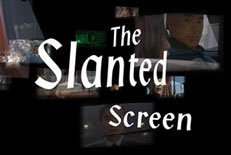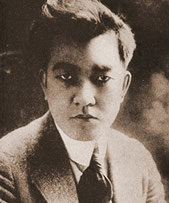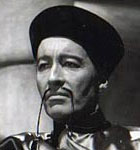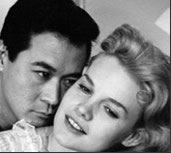Pump You Up: Asian American Film Festival (Part 4)
 |
The Slanted Screen (2006, Dir. Jeff Adachi)
"If I had the choice between playing a wimpy guy and playing a villain, I'll always take the villain, because at least the villain has balls, man."
The portrayal of Asian American men in American cinema (or misrepresentation of said portrayal, or even the lack thereof) is the elephant in the room -- acknowledged to be there, but not necessarily something that's brought up in the course of a normal conversation. With our country battered on all sides by racial "dialogues" that more resemble shouting matches, laments about ethnic minorities getting the shaft in Hollywood would probably be greeted with a shrug and a muttered, Yeah, tell us something we don't know. What has been missing so far is nuance -- a look at the dimensions of the issue.
 |
 |
Those with even a passing knowledge about the plight of the Asian American male actor won't find anything revelatory here. The list is accounted for: Asian males cast in subservient, villainous or emasculated roles, if they're there at all, or presented as caricatured stereotypes played by Caucasians (Christopher Lee as Fu Manchu is a wince-worthy laugher, although in another yellowface role, he also happens to utter one of my favorite lines of all time in The Terror of the Tongs: "Have you ever had your bones scraped, Captain? It is painful in the extreme, I can assure you.") But Adachi, who scraped together the film over a period of eight years while busy running San Francisco's Public Defender office, does a creditable job of providing context and history -- this is classroom material, if classroom material was actually fun.
No surprise, the highlights of the film belong to cantakerous Bay Area writer Frank Chin, who pulls no punches in decrying the battles that must be fought. As he notes, it's telling that Bruce Lee could only get roles as the "mask-wearing sidekick" stateside but had to return to Hong Kong in order to tear off his shirt and portray a "real man." This comment drives to the heart of The Slanted Screen, and its goal: the preoccupation with the Asian male as sex object. Throughout, there is a fixation on the idea that Asian men can be desirable, that they should be getting their share of the lovin' on celluloid. Certainly overcoming a century's worth of stereotypes is a worthy goal, but what is the end state? Can victory be claimed when Asian actors can tally the number of women they bag on-screen, like comparing scorecards? Does equality mean assuming the "identity" of a typical Hollywood leading man or supporting actor? Where does the "Asian" in "Asian American" play into it, if at all? These are charged questions to answer; at one point Tzi Ma mentions a minor role he had in Dante's Peak, and finds some progress in the fact that he could be selected for a role that was "color-blind," to which the Asian American man sitting next to me in the audience hissed, quite loudly, "Bullshit."
 |
The documentary wades into deeper and darker waters when it examines the ways that Asian American visibility in Hollywood can be increased: producer Terence Chang, best known for producing John Woo's thrillers, comments that many Asian American writers and would-be directors send him work that he bluntly calls "terrible," and that just wanting to represent your ethnicity won't be enough to cut it in the Big Leagues. One can read an underlying, unspoken message there: If you wanna make it, you gotta do it at least twice as good as the typical, non-Asian fellas. It is stressed that progress will be defined by the stories that are written and produced, and by production executives who aren't afraid to inject complexity and subtlety. But in the marketplace-driven film economy, where formula is king and artistic risk is the equivalent of flushing money down the toilet, what will be the catalyst? Some like Michael Moore might argue (as he does in the documentary The Corporation) that capitalism can be configured for the forces of good as well as evil, but that would be underestimating the pull of inertia, the path of least resistance. Maybe Bruce Lee had it right, after all.
The Slanted Screen doesn't pretend to know the answers to all of the above, but it certainly encourages such reflections and discussions -- and in a time where the very idea of a defined Asian American male identity in the movies seems as multivariate and uncertain as ever, it suggests quite pragmatically that the best place to start is with straight talk.


0 Comments:
Post a Comment
<< Home